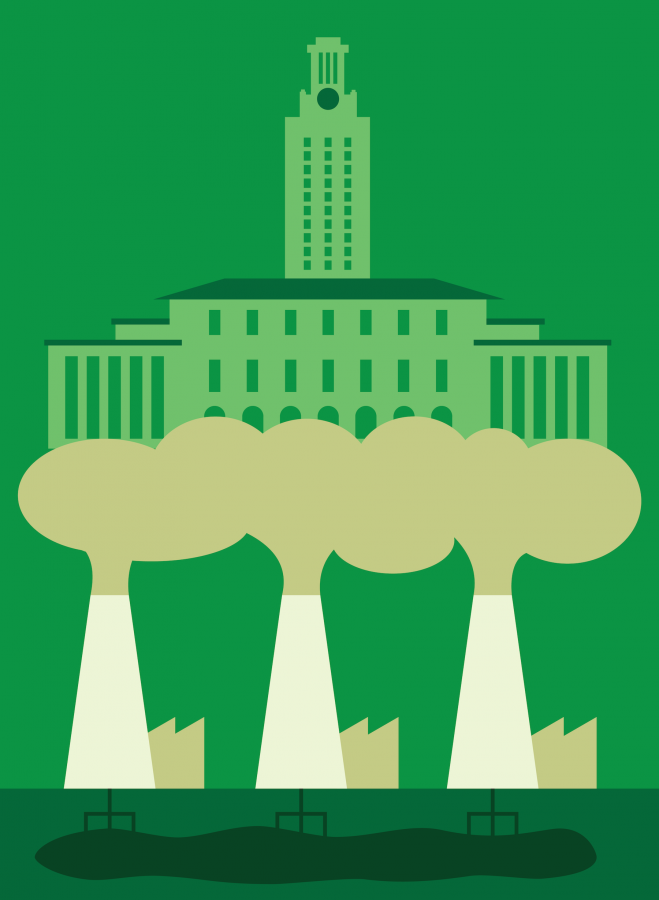Whether you’ve attended a football game or eaten at J2 Dining, you’ve probably observed UT’s zero waste plan in action. The zero waste initiative is a combined effort by Student Government and many other institutions on campus.
While UT’s commitment to zero waste is commendable and important, it should not be the sole focus of green initiatives on campus. Concentrating on zero waste sidelines the more urgent issue at hand: lowering our carbon footprint and transitioning to renewable energy. Stabilizing the global climate is imperative. According to the latest report by the Intergovernmental Panel on Climate Change, the effects of climate change are already here.
The Sustainability Master Plan, a living document UT published in 2016, provides an overarching road map to implement sustainability on campus through 2030. While the plan’s goals are incredibly important, it lacks the usage of quantitative metrics to calculate environmental impacts, especially concerning greenhouse gas emissions.
Although qualitative improvements are vital to changing campus culture, quantitative goals are necessary for setting and improving environmental standards. For this reason, the University should define carbon reduction targets in its 2020 revision of the plan.
According to the Office of Sustainability, campus does not currently have any target goals to lower emissions.
“We track, but we don’t have a goal for greenhouse gas emissions,” said Jim Walker, director of the Office of Sustainability. At this time, the University has yet not released its greenhouse gas inventory, which was scheduled for upload in August.
However, the Sustainability Master Plan is scheduled for a comprehensive review and update in 2020 to establish goals, commitments and strategies for 2020—2025. “(Greenhouse gas reduction) will be a topic of great interest for the update,” Walker said.
Walker said the 2020 master plan revision will launch around spring time as an ongoing conversation about challenges and outcomes between administration, faculty and students. He also said the new 2020 revisions will include a greater focus on the UN Sustainable Development Goals. George Wunch, co-founder of Students Fighting Climate Change, agrees UT should work toward more tangible goals in the revision. “For the 2020 revision, I would push UT to act in a way that corresponds to the severity of the climate crisis,” said Wunch, an international relations and global studies and sustainability studies sophomore.
UT has done significant work in integrating sustainability into our curriculum — the University has adopted the LEED v4 Silver certification for energy efficient buildings as the new campus standard and achieved a 20% reduction in energy consumption per square foot two years early, among other things. UT supports students and faculty through green funds, grants funded by tuition for projects and initiatives related to sustainability that are proposed by students, faculty or staff, the Campus Environmental Center and other programs that incentivize faculty to pursue sustainability. We should celebrate those victories, but we cannot be oblivious to the fact that there are many improvements to be made.
“Hard metrics and targets (are) not where the energy (plan) was in 2015,” Walker said. But as 2020 approaches, there must be a conversation about introducing consistent measurements and targets to reduce our carbon footprint into the framework of the masterplan. We can’t manage what we don’t measure.
The University must set quantitative goals and continuously record them to measure their environmental performance as well as communicate the variables that influence and obstruct progress. Setting management targets demonstrates clear, measurable and adaptable objectives, provides a basis of performance, and helps integrate scientific data into decision processes. Furthermore, it helps hold the University accountable and responsible for lowering emissions.
The Sustainability Master Plan states that the University “strives to make UT-Austin as green a campus as possible and to position the University as a leader in the field of sustainability.” In the 2020 update, the administration should hold true to this mission, grow forward and take the steps necessary to develop measurements and commitments that accurately respond to the pressing environmental need.
Dang is a sustainability studies and business honors freshman from Kerrville, Texas.





















